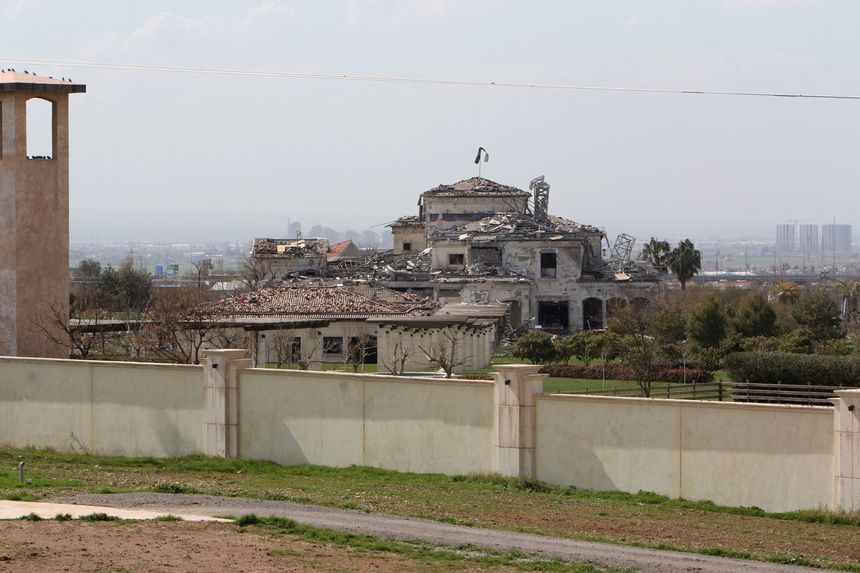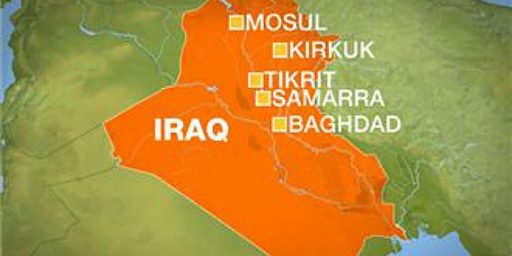Iranian Missiles Hit Near US Consulate in Iraq
No casualties, American or otherwise, have been reported.

Speaking of Iran . . .
WaPo (“Missiles from Iran strike near U.S. Consulate in northern Iraq, officials say“):
A dozen ballistic missiles from Iran struck the northern Iraqi city of Irbil early Sunday, officials said, falling near a U.S. Consulate and television news agency and drawing sharp condemnation from the Iraqi and U.S. capitals.
The attack at 1:30 a.m. local time caused no casualties, according to Lawk Ghafuri, a spokesman for the Kurdistan Regional Government. The missiles were fired from Iran, two officials said, speaking on condition of anonymity due to the sensitivity of the matter.
Ghafuri said some of the strikes had landed near a sprawling U.S. compound where a new consulate building is under construction. It was unclear whether that location was specifically targeted.
The U.S. State Department condemned the attacks in Irbil as “outrageous.” No U.S. troops were injured by the strikes in Irbil, according to an initial assessment provided by a senior defense official, who spoke on the condition of anonymity to discuss a sensitive matter. U.S. military and intelligence personnel operate at a complex at Irbil’s international airport.
In a statement, a State Department official said no U.S. government buildings were damaged and no Americans hurt. The Pentagon deferred questions to the State Department, which did not immediately respond to them.
WSJ (“Iran’s Revolutionary Guard Claims Missile Attack, Raising Tensions“):
Iran’s top paramilitary force appeared to take responsibility for a missile attack early Sunday that slammed into northern Iraq, sending U.S. troops rushing for shelter, shattering windows and creating new complications for diplomatic efforts to ease tensions with Tehran.
The Islamic Revolutionary Guard Corps issued a statement through its official Sepha News site saying that it carried out a missile attack in response to recent Israeli actions in the region, which included an airstrike last week in Syria that killed two of the Iranian paramilitary group’s commanders.
While the Iranian force didn’t explicitly take responsibility for the missile strikes in Iraq, the statement appeared to confirm that the attack originated in Iran. U.S. officials said Iran fired at least a half-dozen missiles at northern Iraq. The Iranian group said it carried out a missile attack on what it claimed were Israeli targets. Israeli officials declined to comment on the strike.
[…]
The attack marks the first time that Iran has directly fired missiles into Iraq since January 2020, when Tehran fired a similar number of missiles at U.S. forces in Iraq in response to an American drone strike that killed Maj. Gen. Qassem Soleimani, the commander of Iran’s paramilitary Quds Force. Scores of U.S. troops were affected by the 2020 strike, which left dozens dealing with traumatic brain injuries.
Some leaders in Iraq urged the U.S. and other world powers to respond to Iran’s strike decisively.
“Iran has been repeatedly targeting the Kurdistan region and the silence from the international community is of great concern,” said the regional government. “This silence from the international community is motivating for more future attacks.”
AP (“Iran claims missile barrage near US consulate in Iraq“):
Iran has claimed responsibility for a missile barrage that struck early Sunday near a sprawling U.S. consulate complex in the northern Iraqi city of Irbil, saying it was retaliation for an Israeli strike in Syria that killed two members of its Revolutionary Guard.
No injuries were reported in the attack, which marked a significant escalation between the U.S. and Iran. Hostility between the longtime foes has often played out in Iraq, whose government is allied with both countries.
Iran’s powerful Revolutionary Guard said on its website that it launched the attack against an Israeli “strategic center of conspiracy” in Irbil. It did not elaborate, but in a statement said Israel had itself been on the offensive, citing the recent strike that killed two Revolutionary Guards.
[…]
The U.S. defense official said it was still uncertain exactly how many missiles were fired and exactly where they landed. A second U.S. official said there was no damage at any U.S. government facility and that there was no indication the target was the consulate building, which is new and currently unoccupied.
[…]
The attack came several days after Iran said it would retaliate for an Israeli strike near Damascus, Syria, that killed two members of its Revolutionary Guard. On Sunday, Iran’s state-run IRNA news agency quoted Iraqi media acknowledging the attacks in Irbil, without saying where they originated.
The missile barrage coincided with regional tensions. Negotiations in Vienna over Tehran’s tattered nuclear deal hit a “pause” over Russian demands about sanctions targeting Moscow for its war on Ukraine. Meanwhile, Iran suspended its secret Baghdad-brokered talks aimed at defusing yearslong tensions with regional rival Saudi Arabia, after Saudi Arabia carried out its largest known mass execution in its modern history with over three dozens Shiites killed.
[…]
The top U.S. commander for the Middle East has repeatedly warned about the increasing threats of attacks from Iran and Iranian-backed militias on troops and allies in Iraq and Syria.
In an interview with The Associated Press in December, Marine Gen. Frank McKenzie said that while U.S. forces in Iraq have shifted to a non-combat role, Iran and its proxies still want all American troops to leave the country. As a result, he said, that may trigger more attacks.’
There’s just too little to go on here to do more than speculate wildly as to the motivation behind the attack but, given that the most obvious impact of this will be to bolster those in the US who oppose the resumption of the JCPOA nuclear deal, my hunch is that was among the primary aims.





I think this needs highlighting:
Also:
I would treat everything Iran’s Revolutionary Guard Corps says with not one, but a whole bunch of grains of salt. So who knows if this is even vaguely true.
Still, if Israel can strike Iranian assets in Syria, why can’t Iran strike Israeli assets in Iraq? After all, it’s not like Israel is facing Iranian attacks from Syrian soil (or that such attacks are even likely.)
Similar to the Pompeo threats, if you break norms, you cannot turn around, do a shocked pikachu face, and complain that others are also breaking the same norms you just violated first.
In order to get away with norm breaking, there has to be a perceived reasonable balance. For example, nobody bitched (maybe some clearly peformative objections, but that’s it) about the US blatantly violating Pakistani sovereignty when it went after Bin Laden. In that case, Pakistan clearly had it coming.
But Israel bombing shit in Syria simply because they don’t like Iran? That’s simply not good enough, and retaliation should be expected. This doesn’t man that what Iran did was right (they struck Iraq, after all). But even so, they didn’t do anything that Israel hadn’t done first.
@drj: And I’m failing to see any reason to say, as the quoted AP story did, that this is escalation between the U. S. and Iran. Which, as James notes, won’t stop GOPs from saying it is.
I’m undoubtedly wrong on some level or another, but I’m having trouble with associating a new United States consulate building and the phrase “strike at Israeli assets in Iraq.” I understand that both American government and American principles are always for sale, but the association of a US government building being an Israeli asset seems too blatant for me.